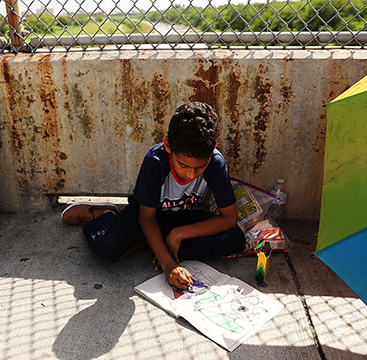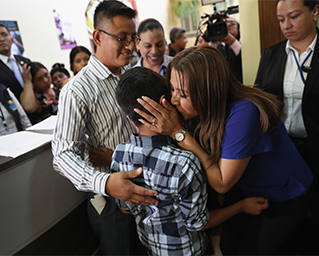On May 7, 2018, the administration implemented a “zero tolerance policy,” pursuant to which all adults found to be entering the United States illegally would be subject to criminal prosecution. Furthermore, all adults who crossed the border accompanied by a minor child would be separated from that child. Many of the individuals affected by this policy were asylum seekers who had been forced to flee their homes due to violence and persecution.
By June, more than 2,300 children had been separated from their parents under this policy, leading to national and international outrage. On June 20, 2018, President Trump signed an Executive Order meant to end the separation of families crossing the border by requiring preservation of the “family unit” wherever possible, while still maintaining enforcement of immigration laws. However, the order did nothing to address reunification of the families already separated and the crisis caused by tearing apart these families and scattering them across the country, often without adequate methods to ensure reunification could be achieved.
In this time of crisis, lawyers throughout the country stepped up and volunteered their services to protect the rights of these families. Gibson Dunn is very proud to have been a big part of that effort. Our firm deployed attorneys to work on the ground at several of the detention centers in south Texas. A team of six attorneys spent their Fourth of July holiday at Port Isabel Detention Center meeting with detainees and representing them in initial proceedings. Attorneys also traveled to local detention centers where detained parents had been transferred, including Albany County Jail, to provide limited scope representation to aid in the preparation of their asylum claims. Additionally, we worked with Catholic Charities to identify the location of hundreds of parents whom the government had failed to adequately track, in order to facilitate reunification of those parents with their children. Finally, the firm took on long-term representation of many of these families to provide ongoing assistance as they apply for asylum or other forms of relief, settle in the United States, and work to create safe, happy, and productive lives here.
The Parents . . . Upon crossing the border, pursuant to the zero tolerance policy, the parents were arrested and taken to a detention center. Their children were almost immediately removed from their custody and taken to a different shelter. In many cases, our clients told us that their children were taken away from them without even an opportunity to say goodbye, sometimes in the middle of the night. More often than not, the parents were not told where their child was taken. Many parents waited weeks before being able to even speak to their child again, and when they were permitted to talk by phone, the calls were understandably emotional and heart-wrenching. | 
|
While enduring this trauma, these parents were simultaneously being expected to navigate the morass of the U.S. immigration system from within the walls of the detention center, more often than not without assistance of any kind. Often they were forced to balance their desire for immediate reunification with a child with their desire to preserve their family’s chance to stay in this country more permanently, as many of them were faced with an unprecedented option of remaining separately detained or being reunified then immediately deported.
To ensure these parents were provided with legal representation, Gibson Dunn attorneys traveled to and worked at several of the detention centers in Texas throughout June and July. Josh Rosario and Phil Shapiro were the first two attorneys to make the journey, each spending a week at Karnes and Port Isabel Detention Center (PIDC), respectively. Over the next few weeks, Abiel Garcia, Eric Haitz, Patricia Herold, Rachel Robertson, Ian Sprague, and Sydney Sherman all spent time at PIDC working with the parents held there to provide counsel and support in preparation for, during, and after their Credible Fear Interviews (CFIs), as well as help to facilitate communication and reunification with their children.
Many of the families caught in this crisis had initially crossed the border to seek asylum in the United States, fleeing life-threatening gang violence or domestic violence in their home countries including Honduras, El Salvador, and Guatemala. The first step in seeking asylum after crossing the border is to submit to a CFI, which is designed to allow an immigration officer to ascertain whether the person has a credible fear of returning to her home country, thereby stating a viable claim for asylum. A positive CFI allows the person to petition for asylum and stay lawfully present in the country while her asylum petition is pending. A negative CFI finding means the person is not permitted to seek asylum and will instead be placed in deportation proceedings.
The story of one of our clients illustrates the conditions under which many of the CFIs took place during this time and the importance of legal representation during that process. Maria is a young mother who crossed the border with her 5-year-old son. Upon crossing, she was arrested and taken to Port Isabel Detention Center. Her son was taken away from her – to where, she didn’t know. For six weeks she stayed in the detention center without being allowed any contact with her son. Finally, one day she was permitted to contact him. Just minutes into the emotional phone call, Maria was told that she needed to hang up and proceed to a different room to undergo her CFI. Though she begged to be allowed to stay on the phone with her son, she was told that she had to do her interview immediately or forego the opportunity to seek asylum altogether. Not surprisingly, as Maria cried her way through most of her CFI, she received a negative determination. Fortunately, our Gibson Dunn lawyers were able to appeal that determination. On review, Maria was found eligible for asylum. She was reunited with her son shortly thereafter and is now proceeding with their asylum applications.
For more detail, I encourage you to read this National Law Journal article authored by several of the Gibson Dunn attorneys who spent time on the ground at Port Isabel Detention Center.
The Children . . . 
| As the detention centers reserved for children in south Texas began to reach capacity, many of the children were relocated to facilities around the country, while still remaining in the custody of the federal government and separated from their parents. Several hundred children were brought to New York and placed in foster care facilities throughout the greater New York City area. Catholic Charities was given purview over many of these children, and worked hard to coordinate legal and social services to be provided to these children, including psychological services to help them deal with the trauma they had endured. |
It quickly came to light that of the approximately 600 children initially relocated to New York City, the government was unable to locate the whereabouts of at least one-third of their parents. Without any system in place to track the family separations, the government had managed to “lose” the parents of at least 200 of these children. Catholic Charities reached out to several law firms, including Gibson Dunn, to help tackle this problem. About a dozen Gibson Dunn lawyers jumped into action, each working with one or more children to identify the whereabouts of each child’s parent. Within a week, through all our combined efforts, we were able to identify the location of nearly all the missing parents.
At Gibson Dunn, Hillary Holmes, Alex Southwell, Claudia Barrett, Josiah Clarke, Chelsea Glover, Ronald Gomez, Vivek Gopalan, Alina Iarve, Megan Kiernan, Kari Krusmark, Miranda Lievsay, Kimberly Lindsay Friedman, Amy Mersol-Barg, Margaret Miceli, Haley Morrisson, Jean Park, Tarana Riddick, Cynthia Schmidt, Katy Sharp, Sam Spears, and Lauren Tetenbaum were all part of this important effort.
Family Reunification Efforts and The Road Ahead . . . 
| On June 26, 2018, U.S. District Court Judge Sabraw issued a nationwide preliminary injunction (the “Order”) in a case filed by the ACLU on behalf of parents impacted by the zero tolerance policy (the case is commonly referred to as the Ms. L case). The Order required the government to stop detaining parents apart from their minor children (absent a determination that the parent is unfit), and ordered the government to reunify all families, within 14 days for families with children under the age of five and within 30 days for families with children age five and older. |
The Order read, in relevant part: “The facts set forth before the Court portray reactive governance—responses to address a chaotic circumstance of the Government’s own making. They belie measured and ordered governance, which is central to the concept of due process enshrined in our Constitution. This is particularly so in the treatment of migrants, many of whom are asylum seekers and small children. The extraordinary remedy of classwide preliminary injunction is warranted based on the evidence before the Court.”
In the weeks that followed, chaos ensued as the government attempted to reunify these families. Gibson Dunn worked with legal aid partners across the country including Catholic Charities, Kids in Need of Defense (KIND), and the Texas Civil Rights Project to help effectuate this reunification in the most thoughtful and appropriate manner possible. Attorneys from across the firm also volunteered, in collaboration with the Lawyers Committee for Civil Rights, to accompany many of these families to their mandatory ICE Check-In appointment in whatever city they had relocated to after release and reunification. Our goal was to ensure that these families’ rights were protected during what continued to be a trying time.
Today, most of the families (though not all) have been released from detention and reunified. The families who will be remaining in the United States and pursuing asylum or another form of relief have settled in cities throughout the country, many living with relatives or friends. Gibson Dunn has taken on a number of these families’ cases and plans to represent them through the conclusion of their asylum matters. Two of these new clients are Eris Hidalgo Ramirez and his 5-year-old son, Jostin. Eris and Jostin fled Honduras to seek asylum here in the United States. Upon crossing the border, the two were separated and reunited after eight long weeks apart. They have settled in New York and are looking forward to working with Rahim Moloo, Charline Yim, Ankita Ritwik, and Maria De Bedout to pursue their asylum claims. For more on their story, please take a look at the coverage Eris and Jostin received on CNN.
Unfortunately, not all the families have been reunified. One of our clients is a young mother, “Ms. Q.”, who has been detained in a federal immigration prison for nearly six months in Laredo, Texas, while her four-year-old child has languished in a separate facility located in Chicago, Illinois. Ms. Q is an asylum seeker who was erroneously denied reunification as part of the Ms. L Order because of an outstanding arrest warrant from El Salvador, the validity of which is in dispute. “DHS simply has no legitimate reason to keep Ms. Q apart from her four-year old son,” said Gibson Dunn attorney Michael Galas in a recent press release. “The vague and unsubstantiated allegations of ‘affiliation’ in a foreign warrant are wholly insufficient to force this mother and child to suffer additional irreparable harm with each day they remain separated. During this time, her child has suffered severe emotional and physical harm. A team of Gibson Dunn attorneys including Katherine Smith, Michael Galas, Abiel Garcia, Wesley Sze, Justin Epner, and Timothy Zimmerman are working hard to reunite this family. You can read more about this case and our client, identified in the article as ‘Ivette’ in this New Yorker article.
Gibson Dunn is also proud to be working side by side with many of our corporate clients on these efforts, including DoorDash, Genentech, and Uber. Thank you to all of the attorneys who have dedicated their time, energy, and valuable skills to helping these families. If you are interested in getting involved, please do not hesitate to contact me. |